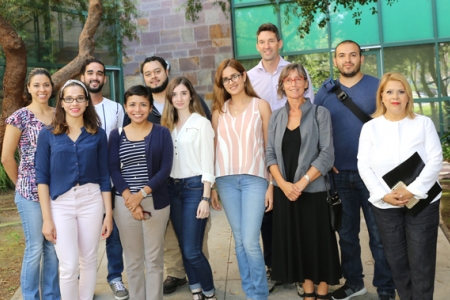Six Grad Students from Mexico Receive Fellowships
 Sept 17, 2018 - Six graduate students from Mexico will matriculate to the Samueli School this fall as participants in UC Irvine’s Mexico Graduate Research and Education Program (MGREP).
Sept 17, 2018 - Six graduate students from Mexico will matriculate to the Samueli School this fall as participants in UC Irvine’s Mexico Graduate Research and Education Program (MGREP).
Launched in 2016 by UCI’s school of engineering, the MGREP facilitates research and academic collaborations between the U.S. and its neighbor to the south.
The six students – three men and three women – came to campus in August for a weeklong summer institute on Life and Climate Change, and as preparatory training for the program.
“These students are in diverse fields of research; their vision and determination to contribute to the well-being of our neighbor region will benefit both of our countries,” said Luisa Kregel, program director.
Four of the six are from Mexicali Baja California, Mexico, and graduated with bachelor’s degrees in renewable energies engineering from Autonomous University of Baja California. They include:
Margarita Rivera Aguayo, whose research will focus on developing sustainable, conscious and novel solutions for the operational process of thermal power plants, where the excessive use of water is required.
“Particularly in the Mexicali region, where plenty of thermal power plants are located and operating even in extremely hot weather and when water resources are scarce, my research will not only benefit the economy by optimizing the current process, it will also contribute to better water use and management,” Aguayo said.
Dianalaura Cueto is interested in power-to-gas research, and she recently spent six months at Hiroshima University, Japan, studying environmental impacts of gas power generation. With this fellowship, Cueto hopes to advance clean, cheap and reliable energy resources that help in the transition to renewable energy. She plans to study sustainable power generation from natural gas of deep ocean water methane hydrates, coupled with electrochemical systems. Her major is environmental engineering and her adviser is Derek Dunn-Rankin.
“Natural gas, a low-emissive fossil fuel, has the potential to fulfill the job as the use of this fuel increases worldwide," said Cueto. "Thus, new sustainable methods to extract natural gas from almost unreachable areas such as the deep ocean are required.”
Brandon Esquivias’ research focuses on energy systems and energy generation. In 2014, he worked at solar and conventional power-generation plants in Mexico City. Then, from August 2015 to December 2016, he completed his professional studies in environmental engineering at the Technical University of Brandenburg in Cottbus, Germany, followed by three months of work at Audi in southern Germany.
"With my research, I look forward to developing economic and innovative solutions to resolving the problems around combined cycle power plants, which have significant environmental impacts. With this work, I hope to be able to help my region make decisions on how to best approach energy generation in Mexico-USA," said Esquivias. He also is majoring in environmental engineering under the advisement of Derek Dunn-Rankin.
Daniela Ruiz is interested in solar thermal energy as a renewable source. According to the Mexico Secretary of Energy, Mexico ranks third in the world in its potential for solar. “I intend to propose a trigeneration system to obtaining heat, cold and electricity. This as a sustainable alternative for the use of depleted natural resources to meet the energy demand of Mexico and the World,” Ruiz said. She is majoring in mechanical engineering and her adviser is Yun Wang.
The remaining two graduate students, who hail from other parts of Mexico, are:
Arturo Meza, from Hermosillo, Sonora. He graduated from the University of Sonora, with a bachelor’s degree in electrical engineering and a master’s degree in nanotechnology. In 2016, Meza spent 12 months in a research internship in semiconductor materials characterization at the University of Texas, Dallas. He is interested in developing new green characterization for manufacturing materials applied to electronic devices. Meza is majoring in materials science and engineering and his adviser is Julie Schoenung.
His research will focus on the development and characterization of new materials composed of high-entropy oxides, which present potential electronic properties that could be used in electronic devices. “The improvement in the active material of such electronic devices will move us forward in the efficiency control of current materials technology, as well as in the exploration of economical ways to obtain and produce those materials and to improve the potential applications that can change the way we produce technology, to eliminate or minimizing environmental impacts."
Ramses Trigo earned his bachelor’s degree in mechanical engineering with a minor in automotive design from Cetys Universidad Campus in Mexicali, his hometown. “Even though I am a mechanical engineer and I did a minor in automotive design, I have been always been passionately interested in the medical field, especially certain diseases and technologies,” he said.
Trigo is a graduate student researcher in the lab of Dr. Arash Kheradvar, professor of biomedical engineering. Along with Kheradvar and project scientist Lawrence Kulinsky, Trigo is developing a new manufacturing technique based on 3D printing processes that would accelerate the production and improve the quality of a hybrid tissue-engineered heart. With the MGREP fellowship, Trigo can finish the second year of the master’s degree. “I am very happy to have this kind of support from Mexico. Doing research in the medical field is what I want to pursue in the future due to its complexity and the impact it has on society.”
The source for fellowships in Mexico is CONACYT, the federal equivalent of the NSF in the U.S. CONACYT’s dedicated program with the University of California is called UC Mexus. The CONACYT and UC MEXUS doctoral fellowship, combined, provides up to five years of funding for Mexican students doing their doctoral studies at any University of California campus.
– Lori Brandt
